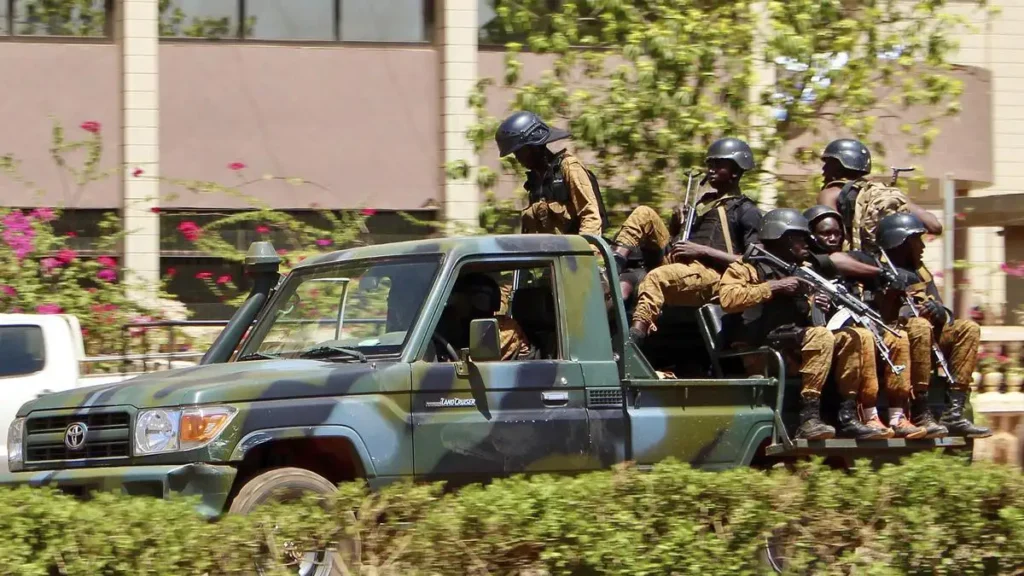Over 100 Killed in Jihadist Attack in Northern Burkina Faso as JNIM Expands Reach
In a devastating incident over the weekend, more than 100 people were killed in northern Burkina Faso following a coordinated attack by suspected jihadist militants. The al-Qaeda-affiliated group Jama’at Nusrat al-Islam wal-Muslimin (JNIM) has claimed responsibility, underscoring its growing influence across the country.

Deadly Assault on Rural Villages
The attack targeted several villages in Yatenga Province, a region that has become a hotspot for extremist violence in recent years. Local reports say militants on motorbikes stormed the communities early in the morning, opening fire on residents, looting homes, and setting buildings ablaze.
Eyewitnesses described the horror that unfolded. “They came without warning and started shooting at everyone. We had no choice but to run,” said one villager who escaped the violence by fleeing into the nearby forest.
Though official casualty numbers are still being verified, regional authorities confirmed that the death toll has exceeded 100, with dozens more injured and hundreds forced to flee.
Expert: JNIM’s Power Growing in Burkina Faso
Security analysts say the scale and coordination of this attack demonstrate the strengthening capabilities of JNIM. “This latest assault highlights the group’s expanding reach and growing power within Burkina Faso,” said Wassim Nasr, a Sahel specialist and senior research fellow at the Soufan Center.
JNIM, which formed in 2017, has been responsible for a series of deadly operations across the Sahel. Its members include veterans from other extremist organizations, making it one of the most resilient and adaptable jihadist coalitions in the region.
Unlike other militant factions, JNIM blends military aggression with local engagement strategies—sometimes negotiating with communities while also using violence to exert control.
Communities in Crisis
The human toll from the attack is immense. Entire villages have been emptied, with survivors seeking refuge in neighboring towns or displacement camps. Humanitarian organizations are struggling to reach those in need due to ongoing security threats in the area.
Emergency workers say many of the wounded require urgent medical attention, but limited infrastructure and a lack of supplies are slowing relief efforts.
“The situation is dire,” said a representative from the Burkina Faso Red Cross. “We are seeing families who have lost everything—loved ones, homes, and any sense of safety.”
This attack adds to an already alarming humanitarian crisis. More than two million people in Burkina Faso have been displaced by violence, and many regions suffer from severe food insecurity, lack of healthcare, and limited access to education.
The Rise of JNIM in the Sahel
JNIM is part of a larger jihadist insurgency that has destabilized several West African nations. Its operations span Mali, Burkina Faso, and Niger, making it one of the most dangerous extremist groups in the region.
The group’s goal is to impose a strict form of Islamic law and to oust both Western influence and national governments it sees as corrupt or illegitimate. JNIM continues to challenge government forces, international peacekeepers, and rival jihadist groups—most notably the Islamic State in the Greater Sahara (ISGS).
Its success has been fueled by state weakness in remote areas, ethnic tensions, and widespread poverty—conditions that jihadist groups often exploit to recruit new members and establish control.
Government Under Pressure
The military-led transitional government in Burkina Faso has pledged to fight terrorism aggressively, but recent events have exposed the limits of its capabilities. Despite ramping up military operations and recruiting local defense volunteers, the state continues to lose ground to armed groups.
President Ibrahim Traoré, who came to power following a coup in 2022, has vowed to restore security and sovereignty. However, critics argue that without a broader strategy that includes economic development, reconciliation, and better governance, military force alone won’t be enough to defeat the insurgency.
Security experts also warn that repeated coups in the region—Burkina Faso, Mali, and Niger have all experienced military takeovers—have further destabilized the region, creating power vacuums that jihadist groups are eager to exploit.
International Condemnation and Urgent Appeals
The global community has condemned the attack. The United Nations, African Union, and several countries have offered condolences and called for justice. However, foreign military involvement in the region has declined in recent years. France, once a key security partner, has reduced its presence amid rising anti-French sentiment and shifting alliances.
Aid organizations are urging donors not to abandon the region. “Every attack worsens the suffering,” said a spokesperson for Médecins Sans Frontières. “Without more international support, we won’t be able to respond to the scale of this crisis.”
A Bleak Outlook Without Action
The attack in northern Burkina Faso is yet another tragic example of how deeply jihadist violence has penetrated the Sahel. For civilians caught in the crossfire, daily life has become a struggle for survival.
As groups like JNIM continue to grow in strength and expand their influence, the stakes for regional stability are higher than ever. Without coordinated action from local governments, regional alliances, and international partners, these attacks will only become more frequent—and more deadly.
Final Thoughts
Burkina Faso faces a complex and urgent security challenge. Rebuilding trust with communities, strengthening local governance, and addressing the root causes of extremism will be essential in any long-term solution.
For now, however, the country remains in mourning—yet another reminder that the battle against jihadist violence is far from over.






